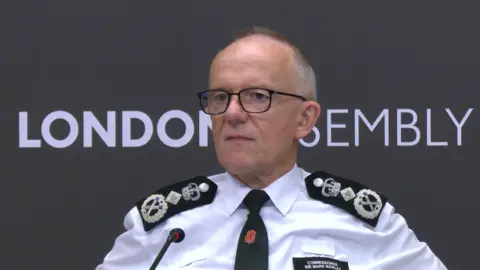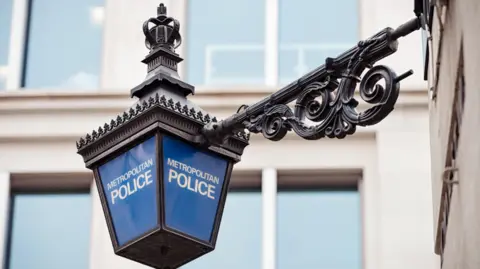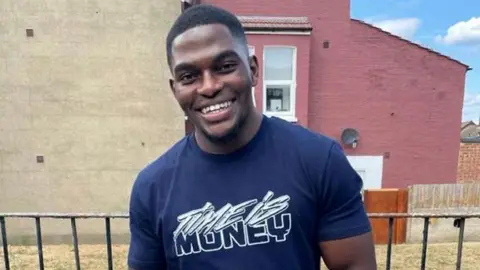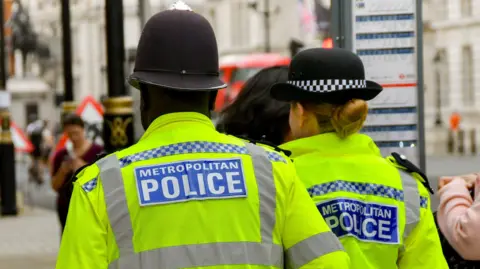Met faces 'eyewatering' choices - commissioner
 London Assembly
London AssemblyThe Metropolitan Police faces "eyewatering choices" if it does not receive more money from the government in the upcoming spending review, its commissioner has warned.
Sir Mark Rowley told the London Assembly that "all services are on the table" when it comes to considering where savings might have to be made, adding he could not guarantee that more police stations would not have to close.
A Home Office spokesperson said the Budget had delivered an increase in funding for the Met, with the force receiving a total of up to £3.5bn in funding in 2024-25.
Other issues discussed included London Mayor Sadiq Khan's response to the Chris Kaba shooting, and police vetting reforms.
Sir Mark said he would not mention "exact numbers" because talks were continuing, but warned "what I'm seeing at the moment creates some eyewatering choices for the year ahead".
He explained that the Met's estate, which includes police stations, is "not in the condition it should be" and half of it would be unusable within five to 10 years.
He said the current budget would only enable refurbishments to be carried out on buildings every 130 years, and claimed an extra £50m a year was needed "to do the basics" and keep buildings operable.
"If some of the decisions I fear we are having to make over the next few months come to bear, then there will be a lot of raised eyebrows and a lot of concern," he added.
The Home Office spokesperson said the £3.5bn in funding in 2024-25 was in addition to £37.4m provided for the 2024-25 pay award, which has been allocated outside of the police funding settlement.
 Getty Images
Getty ImagesDuring the meeting there were heated exchanges between some Conservative Assembly members and Mr Khan over his previous statements about the police shooting of Chris Kaba.
Mr Kaba was shot in the head as he tried to ram his way out of a police vehicle stop in south London.
Police officers did not know who was driving the Audi Mr Kaba was in, but they did know it had been used as a getaway car in another shooting in Brixton, south London, the day before.
Last month firearms officer Martyn Blake was found not guilty of his murder.
After the trial, the judge lifted reporting restrictions on information which had not been made known to the jury, revealing Mr Kaba was part of a gang called the 67.
He had a string of criminal convictions including one for possession of an imitation firearm, and another for possession of a knife.
He had also been captured on CCTV shooting and wounding a rival gang member in a packed nightclub in east London six days before the police stop.
 PA Media
PA MediaConservative Assembly member Susan Hall accused the mayor of being "one sided" in his response days after the shooting, referring to his statement that it was "a young life cut short".
"These armed officers go into situations that none of us would want to be near, and yet there's no sympathy for him [Mr Blake] whatsoever," she said.
She repeatedly asked if Mr Khan would apologise to him, saying some officers were stepping back from firearms duties.
"They are lacking in the support they need and it comes from the top.
"You should be more supportive, or just keep quiet," she continued.
The mayor said he respected the judgment of the jury and expressed his thanks to all police officers, "particularly our firearms officers who do an incredibly difficult job under extraordinary circumstances, under a unique set of pressures".
He said "they'd be the first to accept that it's really important in a democracy we have a proper system of checks and balances in relation to how police are held to account".
Mr Khan said he fully supported the review announced by the home secretary into firearms accountability.
 Getty Images
Getty ImagesConservative Assembly member Lord Bailey told the mayor that his statements following the shooting could be read as "validating some of the worst behaviour possible, and that... you are garnering sympathy for these people".
He told the assembly: "The black community in London is terrorised by the likes of the 67 gang."
Lord Bailey said the police were afraid to confront such groups because they were not getting support from the mayor.
Mr Khan responded that concerns expressed by officers focused on public order policing rather than firearms incidents, and that he had not been named by officers concerned about the issue.
'Balanced debate' needed
The commissioner also added his thoughts on the subject, saying there was sympathy for Mr Kaba's family regardless of the circumstances and there should also be empathy for police officers and the challenges they face.
However, he said Mr Blake "will be the first to say he expected full accountability" for his actions on the day Mr Kaba died.
“Having regular coffees with Martyn Blake over recent months, I’ve been astounded by his personal resilience and dignity with what the world has thrown at him and his family, which has turned his life upside down," he added.
He explained the 67 was among the "most dangerous" gangs in London and accused members of being behind shootings "into double figures" in the capital.
Sir Mark said young black men in London were 13 times more likely to be murdered than young white men and a "balanced debate" was needed about how to solve the problem of how "crime falls on communities".
The commissioner also said he was "disappointed" that reforms to police vetting that he had called for from the government two years ago had yet to be introduced.
He told the Assembly it was "crazy" that officers who failed their re-vetting were not automatically required to leave the force.
He said the Met had taken its own approach in handling such cases, but this was "legally untested" and was now subject to a judicial review brought by the Met Police Federation.
"I am deeply concerned that if we lose that review, that will be tens of officers that no-one would say are fit to wear a uniform having the right to come back," he continued.
The Met Police Federation said its members need to be treated within the law.
Its general secretary Matt Cane said: "In order to protect our members' interests, and ensure the legality of vetting removal, the Metropolitan Police Federation has launched a judicial review of this process.
"The outcome of this court case will determine how vetting-based dismissal is used - and will undoubtedly influence any future vetting revocation regulations."
Listen to the best of BBC Radio London on Sounds and follow BBC London on Facebook, X and Instagram. Send your story ideas to [email protected]
